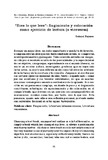Mostrar el registro sencillo del ítem
"Eres lo que lees": fingimiento y colocación como ejercicio de lectura (o viceversa)
| dc.rights.license | http://creativecommons.org/licenses/by-nc-sa/3.0/ve/ | |
| dc.contributor.author | Payares, Gabriel | |
| dc.date.accessioned | 2013-11-25T14:29:01Z | |
| dc.date.available | 2013-11-25T14:29:01Z | |
| dc.date.issued | 2013-11-25T14:29:01Z | |
| dc.identifier.issn | 1315-8392 | |
| dc.identifier.uri | http://www.saber.ula.ve/handle/123456789/37826 | |
| dc.description.abstract | Escoger un mejor libro, un autor importante o una lista de favoritos, o simplemente un libro que nos haya cambiado la vida, es siempre un asunto problemático y peliagudo. Toda selección entraña sus riesgos, no sólo por el resabido asunto de las parcialidades y la imposibilidad de ser objetivo, sino porque, especialmente en el mundo literario, no existe un escritor (crítico, investigador, profesor) que no haya sido lector antes, ni existe una diferenciación como tal entre los avatares de la lectura y de la escritura y la creación. Juzgamos al escritor por sus lecturas y por sus opiniones de ellas, tanto —o quizás más— como por sus escrituras y sus talentos individuales, los que en muchas ocasiones vienen precisamente a contradecir de lo opinado. Eso nos sitúa en un panorama complejo, en donde la pose y el ngimiento constituyen estrategias de agenciamiento y de colocación en el campo letrado, que derivan en un ejercicio casi propagandístico de asociaciones: escribes como lees, por tanto eres lo que lees. Esta ponencia, quizás más afín a una reexión personal, pretende nadar con salvavidas ccional en estas aguas turbulentas. | es_VE |
| dc.language.iso | es | es_VE |
| dc.rights | info:eu-repo/semantics/openAccess | |
| dc.subject | Fingimiento | es_VE |
| dc.subject | Literatura latinoamericana | es_VE |
| dc.subject | Literatura venezolana | es_VE |
| dc.title | "Eres lo que lees": fingimiento y colocación como ejercicio de lectura (o viceversa) | es_VE |
| dc.title.alternative | "You are what you read": Pretense and Placement as a Reading Exercise (or viceversa) | es_VE |
| dc.type | info:eu-repo/semantics/article | |
| dc.description.abstract1 | Choosing a best book, an important author or a list of favourites, or simply a book which has changed our lives, is always a problematic and thorny matter. All choices have built-in risks not only because of the very familiar issue of partiality and the impossibility of remaining objective, but also because, especially in the literary world, there is no writer (critic, researcher, teacher) who was not a reader before, and in addition, there is no differentiation as such between, on the one hand, the avatars of reading and writing, and creation, on the other. We judge writers by what they have read and by their opinions of the same as much as —or perhaps more— as by what they have written and by their individual talents, and the latter on many occasions do in fact contradict opinions expressed. This places us in a complex scenario where posturing and pretense constitute strategies to acquire agency and placement in the eld of learning and these result in an almost propagandistic exercise in association: you write as you read; you are,therefore, what you read. In this paper, which, perhaps, is more like a personal re ection, I shall attempt to swim in these turbulent waters with my life jacket on. | es_VE |
| dc.description.colacion | 25-33 | es_VE |
| dc.description.frecuencia | Anual | |
| dc.identifier.depositolegal | PP89-0023 | |
| dc.subject.dependencia | Maestría en Literatura Iberoamericana | es_VE |
| dc.subject.facultad | Facultad de Humanidades y Educación | es_VE |
| dc.subject.keywords | Pretense | es_VE |
| dc.subject.keywords | Latin American literature | es_VE |
| dc.subject.keywords | Venezuelan literature | es_VE |
| dc.subject.publicacionelectronica | Voz y Escritura. Revista de Estudios Literarios | |
| dc.subject.seccion | Voz y Escritura. Revista de Estudios Literarios: Artículos | es_VE |
| dc.subject.thematiccategory | Artes y Humanidades | es_VE |
| dc.subject.tipo | Revistas | es_VE |
| dc.type.media | Texto | es_VE |
Ficheros en el ítem
Este ítem aparece en la(s) siguiente(s) colección(ones)
-
Voz y Escritura. Revista de Estudios Literarios - Nº 21
enero - diciembre 2013


